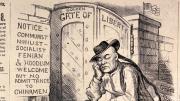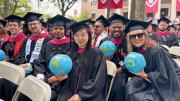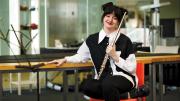The Caged Bird Sings
“I know why the caged bird sings,” wrote Maya Angelou. Growing up, I always wondered why would a caged bird sing? What does it really mean to be caged? Simply, being caged is about confinement: whether literally or figuratively. When I was little, I was really shy. I was not comfortable speaking to people at all. When the time came to speak, I would just feel trapped. That changed when my parents helped me find my voice. They refused to allow me to be caged in any way, so when there was an event at school, I would have to speak. If there was a play at church, I would have to act. My dad even had me in the car repeating every sentence I would hear on the news, so my voice would never feel caged again.
The caged bird sings of hope. Most forms of confinement are not as manageable as shyness. I think of my ancestors who were enslaved where I am from in Mississippi. They were caged, and yet, they sang. They sang spirituals such as “Wade in the Water” as they worked to communicate that the water was a much more discrete route of escape for those fleeing to the North. My ancestors worked and sang in the fields, so one day, I could be free to pursue my dreams. When I began looking at colleges, I thought Harvard was not possible for me. It took my mom who was a guidance counselor for over 25 years to convince me that I was enough. We had not come this far as a family and as a people for me to shy away from chasing the dreams my ancestors were never able to pursue. Because of her encouragement, I went from considering not submitting the Harvard application to being the first Black man elected student body president in Harvard College’s 386-year history.
The caged bird sings of resilience. Throughout this pandemic, all of us have been caged. Quarantine, masking, vaccines, and contact tracing have defined the last two years of our lives. We were caged, and yet, we sang. We sang through our vigilance to COVID-19 protocols. We sang through a year of virtual learning with our classmates scattered across the globe. We sang for this moment in this historic theatre so collectively we could soar into this world as graduates of Harvard: as graduates of truth.
The caged bird sings of equality. Today, as we go beyond Harvard’s gates to pursue our dreams, the only way for us to truly fly freely is for us to uplift those in our communities who are still caged. Today, I think of them. Today, I think about the Black incarcerated man who wrote me a letter from a Florida penitentiary who was jailed for 15 months without bail before he was charged with a nonviolent drug offense. He told me to keep going so one day I could help people like him. This world expects Black men to end up in prison or in a worse situation entirely. There are so many dreams this man would rather be chasing that he cannot because he is caged. But instead of writing to someone who was legally qualified to represent him, he wrote to a Black man who represents the shared dreams of our people.
As we graduate, we must see ourselves in those who are caged. We must use our talents to help them. But most of all, we must be willing to be proximate enough to hear the tune of their song. And when we question why anyone would have enough joy to sing while caged, they will tell us that they sing so those who fly freely will hear their story. I, too, know why the caged bird sings. “The caged bird sings of freedom.”





